#Schaunard
Explore tagged Tumblr posts
Text
yess the fucking Guys are back
#sasha speaks#baseball lb#colline and schaunard i love youu#fuck whatever's going on between posa and carlo let's talk about these guys
5 notes
·
View notes
Text
Every Bohème production can be made like 10% better by letting Schaunard and Colline fag it up a bit in the background of everything else that's going on.
#they have no personalities it's fine. just let them have one thing.#Marcello and Rodolfo dealing with their complicated girlfriend angst meanwhile those two are just sorta chilling. let them gay#it changes nothing. you can change 0 lines and make the show better by giving them something to do!!!#la bohème#la boheme#operablr
10 notes
·
View notes
Text
Quick thoughts on La Boheme:
The writers of Rent got one thing absolutely right: Colline and Schaunard should kiss. (Not to avoid the true OTP of Colline/His Old Coat)
Love that the weird song about the toymaker has no plot relevance and never comes up again. Weird red herring toymakers ftw.
It’s probably not surprising that I find Rodolfo and Mimi less interesting than everything else going on. Musetta and Marcello would probably be very annoying leads, but I enjoyed them as secondary characters.
I was impressed by the Franco Zefirelli sets, especially for the town and cafe. Immersive! (We saw the 2018 Met Opera production)
There were lots of jokes! I knew there were jokes in Acts 1, and 2 but I didn’t expect there to still be jokes in Act 4 right until the dying Mimi enters. I liked the jokes, but sometimes it was a little tonally odd. I guess that’s Romanticism, baby.
Speaking of Rent, I still have no idea where Maureen’s weird cow song comes from. So many of the other strange Rent moments have obvious La Boheme precedent, but I remain confused on that one.
I thought I might cry at the end, because I cry very easily at theater, but I guess I wasn’t invested enough in Mimi. There were some moving moments, but all the standing around singing waiting for death wore me down a bit.
I don’t know enough about anything to have a strong opinion, but my experience of Puccini so far is that some music of his I find beautiful, but sometimes it gets…a little sickly sweet? Unvaried? Is that anything?
I had fun! Glad to have seen it.
#we went out to the movie theater because I’m allowed outside now#so it was a whole event!#elenchus chats#summer opera project 2024
19 notes
·
View notes
Text
Leoncavallo: La Bohème, Act I - Mimì Pinson, la biondinetta - Rosina Storchio (1911)
On May 6th, 1897, Mahler was in attendance at the Teatro La Fenice, in Venice, to hear the world premiere of “La Bohème” opera by Ruggero Leoncavallo, since this title was programmed for the upcoming season of the Wiener Staatsoper. . Mahler was also present at La Fenice the preceding night to hear Puccini’s Bohème, which he had heard during its premiere one year earlier. Upon listening to both versions, he was convinced that Leoncavallo's work was clearly inferior to Puccini's. . Mahler strongly advised Wilhelm Jahn -- who still was director of the Wiener Staatsoper -- that Leoncavallo’s opera should not be performed in Vienna. But Jahn had excellent relations with the composer, so, in June, he signed a “more than modest” contract to produce Leoncavallo’s Bohème.
During Mahler’s time as the conductor of the Wiener Staatsoper, Leoncavallo's La Bohème had a total of 6 performances. Puccini's, which had its premiere in Vienna in 1903, had a total of 61.
On This Day: 6 May: Leoncavallo’s La Bohème Was Premiered.
That work premiered at the Teatro la Fenice in Venice on 6 May 1897, roughly one year after Puccini presented his setting at the Teatro Regio in Turin. Both librettos are based on the novel Scènes de la vie de bohème, originally published in serial form by Henri Murger in 1851, who subsequently turned these loose stories into a coherent play. A scholar writes, “there is some recent evidence to suggest that the scenario on which both operas are based was probably Leoncavallo’s.”
Since Puccini and Leoncavallo worked on their respective works at the same time, it was almost inevitable that a conflict of authorship would arise. Leoncavallo claimed that he had previously offered Puccini a completed libretto. As such, Leoncavallo claimed precedence over the subject. In addition, he asserted Puccini knew all along that he was working on the opera. Puccini responded to the accusation the following day in an open letter to Il corriere della sera, claiming that he had been working on his own version for some time, and felt that he could not oblige Leoncavallo by discontinuing the opera. He also “welcomed the prospect of competing with his rival and allowing the public to judge the winner.” A musicologist writes, “A mutual influence was certainly exercised by the assumption each composer made about his adversary’s libretto and musical style. The deletion of the ‘atto del cortile’ from Puccini’s opera may be seen as a direct consequence of his acquaintance with Leoncavallo’s libretto, whereas Leoncavallo, in the later version of his opera entitled Mimì Pinson, tried to adopt the inverse order of vocal roles, which by that time had been accepted by Puccini’s public.”
A comparison of both works reveals interesting dramatic and musical differences. Leoncavallo adhered closer to Murger’s novel, “disclosed by literary and musical quotations which permeate his libretto and score.” It has been suggested that Leoncavallo approached the work with the realism demanded from verismo opera. In Puccini’s opera it remains unclear, which of the four Bohemian friends is the musician, whereas Leoncavallo immediately identifies Schaunard as the composer. He performs his own composition; a cantata parody in Act 2, accompanying himself on the piano while the orchestra remains silent.
“For one moment the listener has the illusion of being at a party rather than at the opera.” In general, stage music plays a greater role as part of the action in Leoncavallo’s setting, as “he conceives this music as being part of an outside reality grafted onto his work.” And while Puccini balances the contrast between joyous and serious moments and their musical accompaniments in all four acts, Leoncavallo introduces a complete break at the beginning of Act 3. The first two acts are comic opera depicting Bohemian life, while acts 3 and 4 “unmask the carefree exuberance of the first two acts a main affect and unreal. The comedy is but a façade.”
We might also take a quick look at how Leoncavallo, compared to Puccini, deals with Mimi’s illness. For Puccini, Mimi is ill right from the beginning, and illness is an integral part of her personality. As listeners, we always have the suspicion that her illness is the primary reason why Rodolfo falls in love with her. To be sure, the sense of poverty in Mimi’s life is “not unconnected with her illness, but the dominating impression is of a fatality.” In Leoncavallo’s setting, Mimi falls ill during the action as the unmistakable result of her circumstances.
“With no money, she is prematurely discharged from the hospital, and her death is no more than the natural consequence of a medical system perverted by capitalism. Sorrow at her death is mingled with anger at the horrid conditions that caused it.” After the highly successful première of Leoncavallo’s La Bohème, both works coexisted for a decade but Leoncavallo’s work proved less attractive to a broader public. The “impact of Puccini’s musico-dramatic vision and the superiority of his musical invention eventually made history decide against Leoncavallo.”
#classical music#opera#music history#bel canto#composer#classical composer#aria#classical studies#maestro#chest voice#La bohème#Ruggero Leoncavallo#Rosina Storchio#lyric coloratura soprano#coloratura soprano#soprano#classical musician#classical musicians#classical history#opera history#history of music#historian of music#musician#musicians#diva#prima donna#Scènes de la vie de bohème#Henri Murger
10 notes
·
View notes
Text
Once again, my attention turns to small, nitpicky details of staging in opera – namely, the question in La Bohéme of why Rodolfo doesn't see Mimí die. Nearly every production makes the moment of her death clear to the audience by having her hand fall limply to the side of the bed. It's easy enough for Marcello, Musetta, and Schaunard not to notice this, since they're busy heating up the medicine Marcello bought. But why Rodolfo doesn't notice varies between different tenors and different stagings.
Because I'm a romantic sap, I'll admit that my favorite is when he just happens to turn away a moment too soon. He stays by her side throughout her last words, and very briefly breaks into tears when the score calls for it, but then pulls himself together and goes back to watching over her, tucking the blanket more snugly around her, stroking her hair, and maybe giving her a gentle kiss as she dozes off. But then he turns to ask Marcello what the doctor said, and in that instant he misses the moment of her death. Luciano Pavarotti always played it this way; so did David Hobson in the Baz Luhrmann staging, and Ramón Vargas in the 2008 Met Simulcast, among others. This particular staging is, IMHO, the most redemptive for Rodolfo. Even though he pushed Mimí away in the months prior, at her deathbed he finally matures, and gives her his full attention and all the love and care she needs. The fact that he misses her final moment is just a fluke that he can't be blamed for.
Then there's a less sentimental option, which my heart doesn't like very much because it gives us a more self-absorbed Rodolfo, but which my head says is more powerful. In this version, when Rodolfo breaks down in tears, he leaves Mimí's bedside and goes to another part of the room, where he stands or sits alone with his back to everyone until he regains composure, and this is why he misses her death. In the famous 1982 Met telecast, José Carreras runs from the bedside, leaving Teresa Stratas's Mimí to pitifully raise her head and reach out her hand to call him back, only to expire before she can. Now, I know I shouldn't judge Rodolfo too harshly for this... men and emotion, after all... but it's like a final encapsulation of the ways he always failed her. He abandoned her because he couldn't bear to watch her slowly dying, and now, though he comes through and cares for her throughout most of her death scene, at the very end he once again "can't bear it" and walks away, too absorbed in his own grief to be fully there for her.
A third option falls in between the first two. Rodolfo doesn't leave Mimí's side, but once he breaks down crying he can't stop, and as he kneels sobbing into his hands, or into the side of the bed, or as he sits with his back to Mimí as he tries to regain composure, he fails to see her die. Gianni Raimondi in the 1965 studio film does the "sobbing into the side of the bed" variant; Rolando Villazón in the 2009 Robert Dornhelm film does the "sitting with his back turned" variant. At least in this staging, Mimí has the comfort of his presence beside her, but he still gets lost in his own grief, distracting him from her.
Of course, there's technically no reason why he has to miss the moment of her death – he just can't realize what's happened. The libretto doesn't call for Mimí's hand to fall to the side of the bed, that's just a tradition. It would be easy for her to lie in a slightly different position so that the bed supports her arms, and to just appear to drop off to sleep, as she did earlier in the same scene. This way, Rodolfo can be fully there for her and focus on her to the very end, just not realizing right away that she won't wake up again. This is what the libretto's original stage directions seem to imply.
These are small differences, but they each have a very different impact, or at least I think so.
10 notes
·
View notes
Text
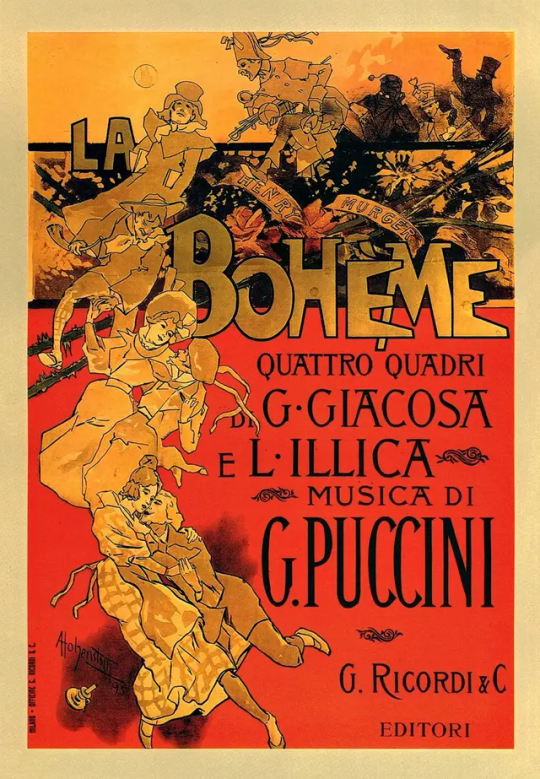
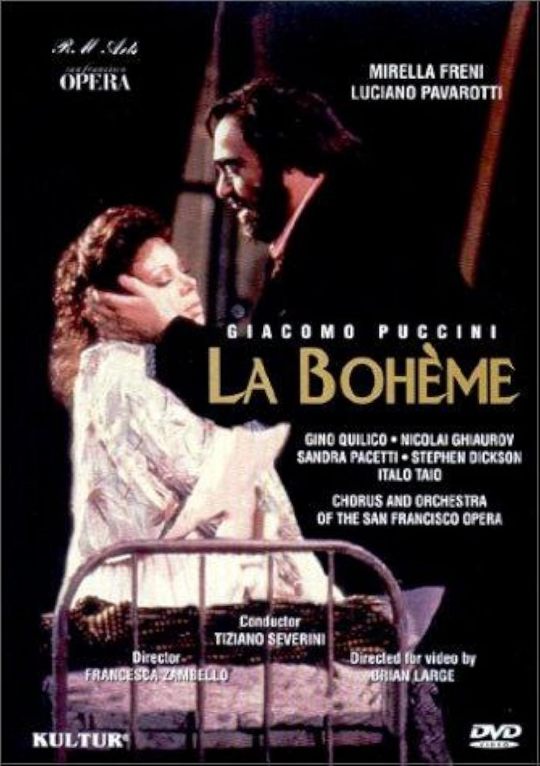
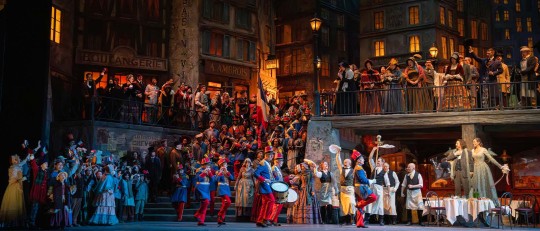
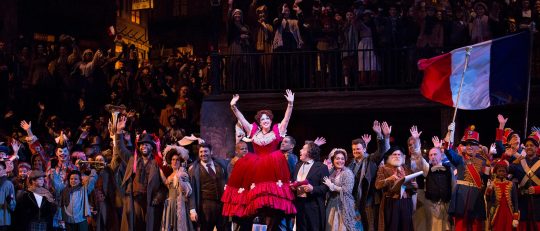
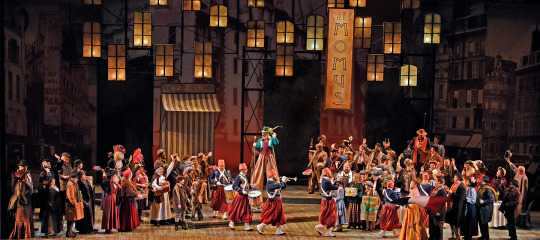
La Bohème
World premiere: Teatro Regio, Turin, 1896.
World premiere: Teatro Regio, Turin, 1896. La Bohème, the passionate, timeless, and indelible story of love among young artists in Paris, can stake its claim as the world’s most popular opera. It has a marvelous ability to make a powerful first impression and to reveal unsuspected treasures after dozens of hearings. At first glance, La Bohème is the definitive depiction of the joys and sorrows of love and loss; on closer inspection, it reveals the deep emotional significance hidden in the trivial things—a bonnet, an old overcoat, a chance meeting with a neighbor—that make up our everyday lives.
Giacomo Puccini (1858–1924) was immensely popular in his own lifetime, and his mature works remain staples in the repertory of most of the world’s opera companies. His librettists for La Bohème, Giuseppe Giacosa (1847–1906) and Luigi Illica (1857–1919), also collaborated with him on his next two operas, Tosca and Madama Butterfly. Giacosa, a dramatist, was responsible for the stories and Illica, a poet, worked primarily on the words themselves.
The libretto sets the action in Paris, circa 1830. This is not a random setting, but rather reflects the issues and concerns of a particular time when, following the upheavals of revolution and war, French artists had lost their traditional support base of aristocracy and church. The story centers on self-conscious youth at odds with mainstream society—a Bohemian ambience that is clearly recognizable in any modern urban center. La Bohème captures this ethos in its earliest days.
ACT I
Paris, in the 1830s. In their Latin Quarter garret, the near-destitute artist Marcello and poet Rodolfo try to keep warm on Christmas Eve by feeding the stove with pages from Rodolfo’s latest drama. They are soon joined by their roommates—Colline, a philosopher, and Schaunard, a musician, who brings food, fuel, and funds he has collected from an eccentric nobleman. While they celebrate their unexpected fortune, the landlord, Benoit, comes to collect the rent. After getting the older man drunk, the friends urge him to tell of his flirtations, then throw him out in mock indignation at his infidelity to his wife. As the others depart to revel at the Café Momus, Rodolfo remains behind to finish an article, promising to join them later. There is another knock at the door—the visitor is Mimì, a pretty neighbor, whose candle has gone out in the stairwell. As she enters the room, she suddenly feels faint. Rodolfo gives her a sip of wine, then helps her to the door and relights her candle. Mimì realizes that she lost her key when she fainted, and as the two search for it, both candles go out. Rodolfo finds the key and slips it into his pocket. In the moonlight, he takes Mimì’s hand and tells her about his dreams. She recounts her life alone in a lofty garret, embroidering flowers and waiting for the spring. Rodolfo’s friends call from outside, telling him to join them. He responds that he is not alone and will be along shortly. Happy to have found each other, Mimì and Rodolfo leave, arm in arm, for the café.
ACT II
Amid the shouts of street hawkers near the Café Momus, Rodolfo buys Mimì a bonnet and introduces her to his friends. They all sit down and order supper. The toy vendor Parpignol passes by, besieged by children. Marcello’s former sweetheart, Musetta, makes a noisy entrance on the arm of the elderly, but wealthy, Alcindoro. The ensuing tumult reaches its peak when, trying to gain Marcello’s attention, she loudly sings the praises of her own popularity. Sending Alcindoro away to buy her a new pair of shoes, Musetta finally falls into Marcello’s arms. Soldiers march by the café, and as the bohemians fall in behind, the returning Alcindoro is presented with the check.
ACT III
At dawn at the Barrière d’Enfer, a toll-gate on the edge of Paris, a customs official admits farm women to the city. Guests are heard drinking and singing within a tavern. Mimì arrives, searching for the place where Marcello and Musetta now live. When the painter appears, she tells him of her distress over Rodolfo’s incessant jealousy. She says she believes it is best that they part. As Rodolfo emerges from the tavern, Mimì hides nearby. Rodolfo tells Marcello that he wants to separate from Mimì, blaming her flirtatiousness. Pressed for the real reason, he breaks down, saying that her illness can only grow worse in the poverty they share. Overcome with emotion, Mimì comes forward to say goodbye to her lover. Marcello runs back into the tavern upon hearing Musetta’s laughter. While Mimì and Rodolfo recall past happiness, Marcello returns with Musetta, quarreling about her flirting with a customer. They hurl insults at each other and part, but Mimì and Rodolfo decide to remain together until springtime.
ACT IV
Months later in the garret, Rodolfo and Marcello, now separated from their girlfriends, reflect on their loneliness. Colline and Schaunard bring a meager meal. To lighten their spirits, the four stage a dance, which turns into a mock duel. At the height of the hilarity, Musetta bursts in with news that Mimì is outside, too weak to come upstairs. As Rodolfo runs to her aid, Musetta relates how Mimì begged to be taken to Rodolfo to die. She is made as comfortable as possible, while Musetta asks Marcello to sell her earrings for medicine and Colline goes off to pawn his overcoat. Left alone, Mimì and Rodolfo recall their meeting and their first happy days, but she is seized with violent coughing. When the others return, Musetta gives Mimì a muff to warm her hands, and Mimì slowly drifts into unconsciousness. Musetta prays for Mimì, but it is too late. The friends realize that she is dead, and Rodolfo collapses in despair.
1 note
·
View note
Text
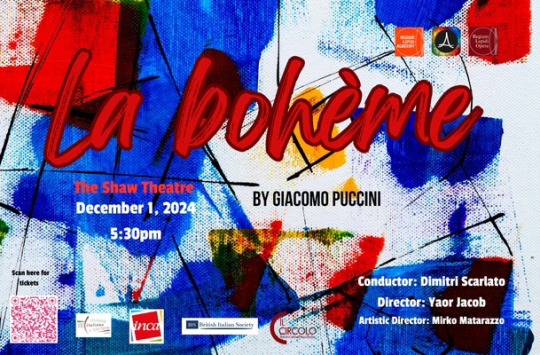
Di Annalisa Valente Arriva domenica 1 dicembre al The Shaw Theatre di Londra la Bohème di Puccini nell'allestimento visto a luglio a Reggio Emilia. Direzione artistica di Mirko Matarazzo e direzione d'orchestra di Dimitri Scarlato. La Bohème diretta da Mirko Matarazzo e Dimitri Scarlato arriva a Londra La Bohème diretta dal Maestro Dimitri Scarlato arriva a Londra. Domenica 1 Dicembre alle 5.30pm presso The Shaw Theatre l’opera prenderà vita con la regia di Yaor Jacob e la direzione artistica di Mirko Matarazzo. Dopo il successo ottenuto il 29 e il 30 Luglio scorsi al Teatro Asioli di Correggio (Reggio Emilia) nell’ambito della prima edizione del Regium Lepidi Opera Festival, promosso proprio dal Tenore Matarazzo, che anche allora ne fu il direttore artistico, ora è Londra ad ospitare un’opera così importante e conosciuta in tutto il mondo. Promotore dell’iniziativa nella capitale britannica è stato proprio Scarlato, che già da fine estate ha iniziato a lavorare senza sosta per mettere in piedi un progetto ambizioso e non privo di difficoltà, a partire dalla composizione del cast e dalla ricerca dei fondi. “Si tratta di un progetto fatto per celebrare il centenario pucciniano all’interno della comunità italiana a Londra, che è molto vasta – ci spiega Dimitri - ed è per questo che ho chiesto il sostegno all’Istituto Italiano di Cultura. E poi c’è Il Circolo che sta attivamente aiutando, è quasi un partner perché nella ricerca dei fondi mi sta aiutando molto. E c’è anche la British Italian Society che è un altro sponsor”. Tra i sostenitori del progetto, anche Inca. Naturalmente le istituzioni sono state invitate alla serata, che sarà un appuntamento unico e da non perdere: “Il Console Generale ha confermato la sua presenza”. Quello del Maestro Scarlato non è l’unico tributo a Giacomo Puccini in questo anno che sta per avviarsi alla conclusione e che ha collezionato tanti eventi in omaggio al grande compositore italiano, in occasione del centenario della sua morte. Come la stessa opera, che sarà rappresentata, sempre a Londra, dalla Royal Opera House entro la fine dell’anno. Ma questa del Maestro Scarlato ha qualcosa di diverso, che si può benissimo definire una marcia in più. “Nel mio piccolo – sottolinea Dimitri - ho voluto fare qualcosa che non fosse soltanto per pianoforte e cantanti, in un piccolo ambiente; volevo fare una cosa un po’ più in grande, quindi mi sono imbarcato in questo sforzo, non soltanto economico, perché produrre un’opera coinvolge tanti aspetti. Avremo quindi una versione per più strumenti in modo da offrire un suono più importante, più bello, per sostenere il lavoro dei cantanti”. Quindi, eccoli qui, gli artisti coinvolti ne La Bohème di Domenica 1 Dicembre a Londra: - Zoya Gramagin - Mimi - Hassen Doss - Rodolfo - Lilian Tong - Musetta - Giuseppe Pelligra - Marcello - Gabriel Tufail Smith - Colline - Barnaby Beer - Schaunard - Yuki Okuyama - Benoit / Alcindoro - Katya Berdnikov - Un Ragazzo - Fernando Messulam – Parpignol Insieme a Dimitri Scarlato (direttore d’orchestra) e a Mirko Matarazzo (direttore artistico), il regista è Yaor Jacob, scelto direttamente da Scarlato per ricoprire questo ruolo, determinante per la buona riuscita della serata. “Si tratta di un mio allievo al Royal College of Music (dove Scarlato è responsabile del Masters in Composition for Screen, n.d.r.) che studia composizione per il cinema, viene dal mondo del teatro, del musical; l’ho contattato per sapere se avesse potuto interessargli fare la regia e lui ha colto la palla al balzo. Anche lui quindi è pienamente coinvolto come me nella realizzazione del set, nella scelta dei costumi (che comunque caratterizzano una versione moderna dell’opera), le luci, ecc. E’ una cosa bella anche per i giovani artisti che hanno l’opportunità sia di debuttare nel ruolo sia di mettersi alla prova con un titolo così importante, per acquisire esperienza professionale”. Ci sembra che le prerogative per un grande successo ci siano proprio tutte, non resta quindi che attendere la sera del 1 Dicembre perché le luci de La Bohème risplendano su Londra, che in quel momento sarà già immersa nell’atmosfera magica del Natale, quasi alle porte. Una serata unica, uno spettacolo unico, che sarebbe davvero un peccato perdere. Per esserci bisogna affrettarsi cliccando qui. Siamo sicuri che sarete in tanti. ... Continua a leggere su
0 notes
Text
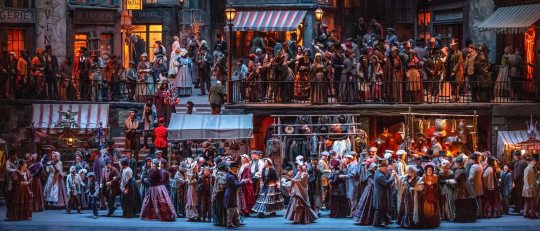
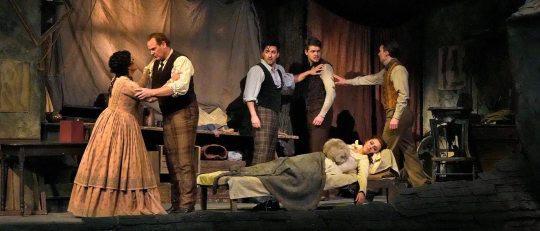
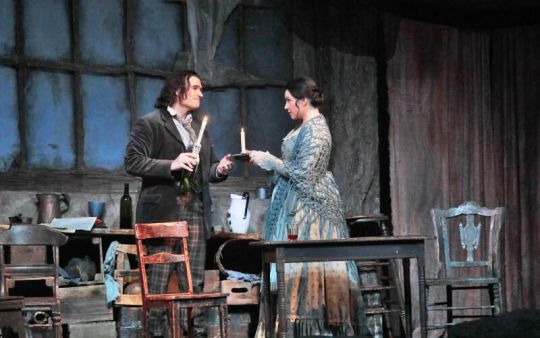
#ElEscenarioDelMundo #ProyeccionDeVida
🎬 “LA BOHÈME”
🔎 Género: Ópera / Música
⏰ Duración: 135 minutos
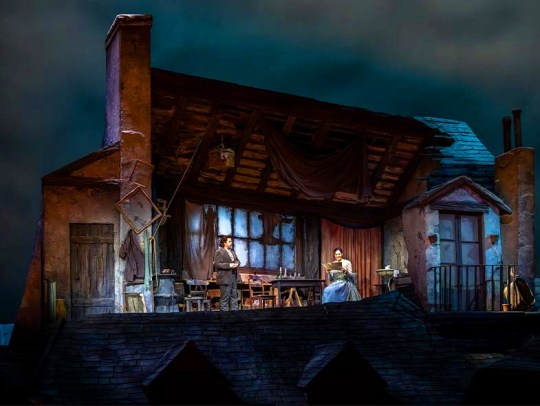
✍️ Guión: Giuseppe Giacosa y Luigi Illica
📕 Escenas de la Vida Bohemia de Henry Murger
🎼 Música: Giacomo Puccini (1858–1924)
💥 Ópera en cuatro actos que nos sitúa en París (1830). No se trata de un escenario aleatorio, sino que más bien refleja los problemas y preocupaciones de una época particular en la que, tras los trastornos de la revolución y la guerra, los artistas franceses habían perdido su base de apoyo tradicional de la aristocracia y iglesia. La historia se centra en una juventud consciente de sí misma y en desacuerdo con la sociedad en general: un ambiente bohemio que es claramente reconocible en cualquier centro urbano moderno. La Bohème captura este espíritu en sus primeros días.
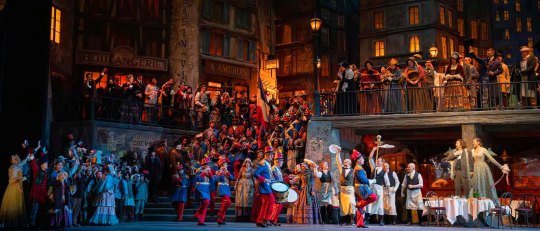
🗯 Apasionada, eterna e indeleble historia de amor entre jóvenes artistas de París, puede reclamar su título como la ópera más popular del mundo. Tiene una capacidad maravillosa para causar una primera impresión poderosa y revelar tesoros insospechados después de decenas de audiencias. A primera vista, La Bohème es la descripción definitiva de las alegrías y tristezas del amor y la pérdida; Si se examina más de cerca, se revela el profundo significado emocional escondido en las cosas triviales (un sombrero, un abrigo viejo, un encuentro casual con un vecino) que conforman nuestra vida cotidiana.

👥 Reparto: Sonya Yoncheva (soprano - Mimì), Michael Fabiano (tenor - Rodolfo), Susanna Phillips (soprano - Musetta), Lucas Meachem (barítono - Marcello), Alexey Lavrov (barítono - Schaunard), Matthew Rose (Colline), Paul Plishka (Benoit / Alcindoro), Gregory Warren (tenor - Parpignol) y The Metropolitan Opera Orchestra & Chorus.
📢 Dirección: Marco Armiliato (Italia)
© Producción: Franco Zeffirelli y Metropolitan Opera de Nueva York
🌎 País: Italia
📅 Año: 2018
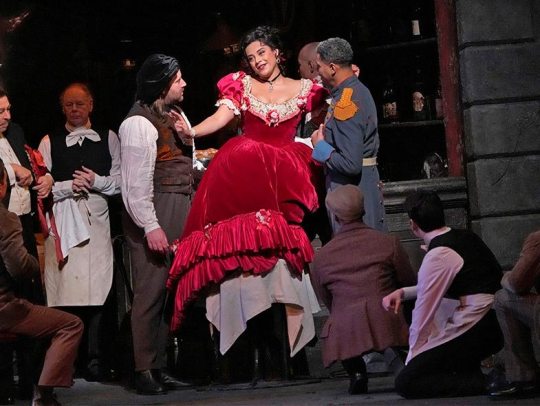
📽 PROYECCIÓN:
📆 Sábado 17 de Agosto
🕛 12:00m.
🏪 Movie Time Basadre (calle Palmeras 343, Urbanización Orrantia - San Isidro)
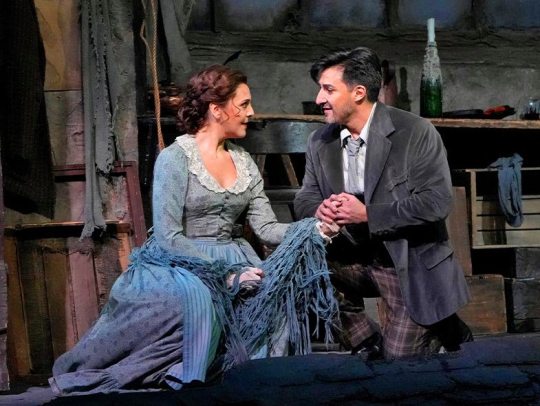
🎯 Entradas:
🎫 Adultos, Niños y Jubilados: S/.75
🖱 Reservas: https://movietime.com.pe/peliculas/2856
0 notes
Text
And finally, because it's fitting to end with a Di Stefano duet.
0 notes
Text
la boheme easily my favorite puccini opera i've seen thus far, and it's like not even close. but arguably one of the very best parts about it is that puccini wrote colline and schaunard to somehow be gayer than their actual canonically gay counterparts in rent
#sasha speaks#plus they're just like comic relief for most of their stage time and they're not even in act iii. yet they have so much personality#arguably even more than collins and angel! surprising that
8 notes
·
View notes
Text
Zoltan Nagy started his international career as the youngest ensemble member of the Vienna State Opera. Recognized by opera critics for his strengths in both dramatic and comic roles, he is regularly invited to perform as a guest artist in many of Europe’s leading opera houses. Zoltan’s most requested role is Escamillo (Carmen), a role he has performed in over 12 productions in theatres like Bilbao (ABAO), Teatro Massimo di Palermo, Teatro Grande di Brescia, Teatro Ponchielli di Cremona, Teatro Sociale di Como, RTE Orchestra in Dublin, Romanian National Opera Bucharest and Cluj, the Shaanxi Grand Opera House in China, the State Theatre of Nuremberg, among others. As a permanent guest soloist of the Hungarian State Opera, Budapest, Zoltan has been invited to perform the role of Guglielmo (Cosi Fan Tutte), Silvio (Pagliacci), the title role in Kodaly’s Hary Janos, and Schaunard (La Bohème), a title he has performed at Oper Leipzig, Opera de Nice, Singapore Symphony Orchestra (in concert), Vlaamse Opera Antwerpen, and Opera Ghent among others. Zoltan made his Bolshoi Theatre of Moscow debut with the role of Count Almaviva (Le Nozze di Figaro). He has sung Haraschta (The Cunning Little Vixen) at the Hamburg State Opera, Dr Falke (Die Fledermaus) at Teatro Verdi Trieste, Calchas (Iphigenie en Aulide) in Athens, Schmied (Egk’s Peer Gynt) in Theater an der Wien, where he also had the privilege to join Edita Gruberova for her gala concert. Zoltan made his debut as Alberich (Siegfried) at Teatro Campoamor in Oviedo. He sang Marcello in a new production of La Bohème at Teatro Comunale di Sassari, portrayed the role of Dulcamara in a new production of L’Elisir d’Amore at the Romanian National Opera, and was invited to give masterclasses at the Xi’an University of Music in China. Count Tomski was a role debut in a new production of Tchaikovsy’s Pique Dame at the Opera Festival Heidenheim accompanied by the Stuttgarter Philharmoniker. Zoltán returned to Oviedo for a new production of Götterdämmerung where he performed the role of Alberich. He sings the role of Theseus in the Essen Philharmonic’s CD live recording of Bohuslav Martinu’s Ariane directed by Czech conductor Tomas Netopil, released in 2016 on Supraphon. Zoltan has worked with conductors such as Marco Armiliato, Pinchas Steinberg, Ulf Schirmer, Renato Palumbo, Fabio Luisi, Marc Minkowski, John Wilson, Alejo Perez, Tomas Netopil, Guillermo Garcia Calvo, Leo Hussain, Marcus Bosch among others. Some of the stage directors Zoltan has collaborated with are: Peter Konwitschny, Damiano Michieletto, Inga Levant, Stefano Poda, Calixto Bieito, Paris Mexis, Thorsten Fischer, Georges Delnon, Maurizio Scaparro, and Immo Karaman. He has collaborated with the Vienna Philharmonic, Robert Schumann Philharmonie, RSO Vienna, Vienna Symphony Orchestra Singapore Symphony Orchestra, National Taiwan Symphony Orchestra, Orchestra of the Romanian National Radio, Hungarian National Philharmonic Orchestra among others. Zoltan studied at the Gheorghe Dima Music Academy in his hometown Cluj-Napoca under Professor Gheorghe Roşu. Upon graduation, he received a full scholarship to study at the prestigious Mozarteum University in Salzburg for a Masters degree in voice performance with Professor Boris Bakow. He has won prizes at various singing competitions including the Romanian National Song Competition, the Hariclea Darclee International Voice Competition, and “Debut”, the European Opera Singing Competition in Germany. In 2012 Zoltan participated in the Salzburg Festival’s Young Singers Project, and was then selected to sing in the Festival’s production of Das Labyrinth. Recent engagements included two new production of La Wally and Jenufa at Theater an der Wien, a new production of The Raise and Fall of the city of Mahagonny in Parma. Future higlights of his saison include a debut at Regio Torino as Escamillo, a ROH debut in La Bohème as Schaunard and a debut at Komische Oper Berlin in the Love of the three oranges as Leander.
Dear Zoltan, I’m so glad to meet you, this time in Italy! And I am very much looking for- ward to your house debut at Teatro Regio di Parma! What has been your relationship with the Italian theatres throughout your career and what does this event mean to you? In my nearly 15 years of international career I have been lucky enough to be part of some wonder- ful productions all over the world starting with Vienna until Singapore, but singing ocasionally in Italy, becomes each time on of the highlights of my season. My first ever concert accompanied by an orchestra abroad was actually in Palermo when I was 22. Since then I was dreaming about singing one day at Teatro Massimo which was closed for renovation those years. Several years later my dream came true and I was indeed portraying the role of Escamillo in that amazing opera house… I always used to say, that a part of my heart is in Italy. I’ve also worked on several occa- sions at Teatro Verdi in Trieste, one of them was a very funny production of Die Fledermaus (Dr. Falke) with the late Gianluigi Gelmetti conducting who I was very fond of. I have beautiful memo- ries of Sardegna where I’ve done a new production of La Bohème as Marcello, and later a Pagliacci as Silvio. Singing at Teatro Regio in Parma is an absolut honor for me not only because of the enormous tradition that surrounds this opera house but also because of the fact that I am a guest artist in a very unusual production that should make history in Parma. Tell us more about this opera, about the role that you’re about to perform and the produc- tion that will be on stage at Regio di Parma this month (April)? Rise and Fall of the City of Mahagonny is an opera, although I like to call it rather music theater/ music play… composed between 1927-1929 by Kurt Weill on Bertold Brecht’s libretto, where I will interpret the role of Trinity Moses. When I first saw the score, I said to myself… “oh, I’ll deifinitely need some time to learn this music and get used to certain rhytms“. I’ve seen it challenging but I ended up having great fun singing this part and enjoying Weill’s geniality. The opera was a scandal on its premierere in Leipzig in 1930, presenting the decandece of the society which is more then actual nowadays where money is everything. I hope the audience will be receptive, of course, one should not expect a coservative staging for this type of music. I’m sure everyone will leave the the- ater whistling the Alabama song at the end of the performance… and realizing hopefully how en- joyable this music is. reposted from https://opera-charm.com/
0 notes
Video
youtube
Let’s continue our wonderful and “loveful” week that is dedicated for sure Valentine’s Day, here at Musica in Extenso. (not just for couples!)
Today we will relive the beautiful and enchanting music of the great italian opera composer, Giacomo Puccini. For this special Valentine’s Week edition, I chose the famous Musetta aria (La boheme) Quando m'en vo’ (Musetta’s Waltz) in instrumental version from the Puccini - Without words album, because we can speak the language of love in the best way, focusing on what we do; it’s important than what we say.
Enjoy! ❤️ - Editor-in-Chief
#giacomo puccini#la boheme#laboheme#musetta#mimi#rodolfo#schaunard#colline#marcello#puccini#giacomopuccini#musettaswaltz#waltz#quando me'n vo'#quando#aria#soprano#music#voice#opera#conductor#orchestra#italian#composer#composition#withoutwords#love#valentine#valentines day#musicainextenso
29 notes
·
View notes
Note
RENT characters meeting their La Boheme counterparts,, go
OH FUCK YEAH
So how they meet, idk. But they somehow get transported to the others’ universe.
• Mark and Marcello get along pretty much instantly. Although Mark is kinda offended by the way Marcello talks about women. Like “wtf dude have you met a woman” (though workshop Mark would outmatch this)
• Roger and Rodolfo…are the opposite. Roger is immediately ready to fight him “what the fuck you pretentious fucker wHAT DO HALF THE THINGS YOU’RE SAYING MEAN” and Rodolfo is like “….? please calm down I’m a poet I have to pretty much always be creating my art” “fUCKIN FIGHT ME”
• Collins and Colline also hit it off and Colline is grateful to be introduced to weed
• Angel and Schaunard are like Sass Extraordinaire and try to outsass each other
• Maureen and Musetta try to /outsing/ each other, and that’s nearly worse than the Sass Battle
• Alcindoro and Joanne…do not get along. At all.
• Benny couldn’t feel more meh about Benoit
• Oddly enough, Mark and Rodolfo immediately get along as if they were best friends, as do Marcello and Roger.
Bonus:
• Parpignol and The Man end up creeping the fuck out of everyone.
#la boheme#rent#ask#Puccini#Larson#Mark Cohen#roger davis#joanne jefferson#maureen johnson#benjamin coffin iii#Benny#mimi marquez#angel dumott schunard#tom collins#marcello#rodolfo#mimì#Colline#schaunard#Benoit#musetta#alcindoro#parpignol#the man
172 notes
·
View notes
Text
Captives:
Chapter(x), with 5<x<7
Work: Lucia di Lammermoor/La Boheme crossover
Vampire!Ashtons, Fairy!Bucklaws.
Notes: Arturo and Lucia both survived their wedding night.
Main character: Marcello (for the most part)
Author notes: Whatever
When Rudolfo was taken upstairs via a ladder through a disused lavatory which lead to the kitchen through a small courtyard. He was beginning to wonder at the architecture of this place. When he entered the kitchen, a small army of kitchen maids began to scold him for getting in their way, which put him in a rather awkward situation, because the Lord Ashton had completely vanished from sight. When he finally managed to break their ranks and lodge himself in the trench that had been dug in the downstairs hallway to provide shelter from the heavy culinary artillery, he had a moment of respite to consider what he had just seen and what it meant.
Ashton had charged him with silence. Therefore, he had to ensure that the secret got out. The trouble was doing this in such a manner as to prevent implicating himself, and thus damning his companions. As crawled through the mud and into the safe-zone, he tried to piece together what they knew about the situation so far. Lord Ashton’s sister had been in love with a human. She had married a fairy instead. She went mad and attempted to kill the fairy, then Ashton turned the lover and locked him in the basement, then went to kidnap a small posse of Frenchmen to serve as a potential foodsource for the brood. While he was there, he picked up one such Frenchman’s ex-lover as his own fiance.
Aside from the fact that it would make a damn good opera, this was certainly the most useless conspiracy that Rudolfo had ever stumbled upon. It was so needlessly convoluted that it had surely been devised by a fairy for the express purposes of entrapping somebody in some sort of bargain or contract, except that the fairy was obviously stupidly amateur considering it hadn’t really succeeded in trapping anybody, so much as connecting a variety of disparate (and each uniquely melodramatic and pointless) parts.
---
Marcello had spent days agonizing over his paintings and their dilemma. He was not convinced (none of them were) that the mere knowledge of the scandal would help their case with Bucklaw, considering the information was safely sealed away. Fairies did not necessarily take well to blackmail.
Scandal did fill his mind, though, and he was something of an expert at making them - an art learned from the greatest master of all: Musetta. There were skeletons in this family’s closet, and people who hid their skeletons were usually adept at making more of them.
There was an unexpected knock at his (open) door. It was unexpected because nobody in this house ever bothered to knock except a few of the servants, and they were always conveniently out of scene. He looked up from his painting to see the Lord Bucklaw himself standing just outside the doorway with a charming, yet somewhat bashful smile. Marcello’s first thought was to redirect him to Schaunard’s room.
“I hope I’m not interrupting anything,” Arturo said. “Since I was by, I thought I would stop to visit. Are you well, since last we spoke?”
Marcello, in that meantime, had accidentally invented surrealism in his ever-growing frustrations with the painting, but he was also making a steady advance on the larger commission itself. He allowed himself a deep sigh. “If you can define ‘well’ loosely in order to encompass this never-ending monotony and imprisonment, I suppose I am quite well.” He rubbed his temples, inadvertently getting paint in his hair.
“I’m again apologetic for my brother-in-law’s ill treatment of you,” Arturo replied with a frown and a quirk of his lips. “As a man, I’m horrified at this situation. Unfortunately, I’m not just a man, and I can’t violate the law of his house while I’m in it.”
“But these paintings are for you, are they not? She’s your wife, correct?”
“That merely puts me in more of a bind. You are, for the purposes of this exercise, one of his resources; and he is freely using his resources to provide this service. I’m no more bound to him than the laws of kinship demand since she is his sister, but it would be impossible to violate our terms.”
At first, Marcello’s lungs were alight with fiery rage, but it was short-lived. He sighed, his body sagging under the weight of it. This isolation was wearing on all of them. In particular, as the difficulties mounted, his more self-reflective friends were beginning to withdraw in their various ways; Marcello, for his part, was of a much more social temperament, and he was getting lonely. Rudolfo was his chief companion, but Rudolfo’s contemplations were becoming more private by the day, and Schaunard was often occupied with his usual employment in the vampire’s dining room or parlor. Colline, it seemed, had all but vanished; they saw him frequently, but he enjoyed their company from a silent corner, and often slipped away so furtively that not even Schaunard dared to follow him.
He had intended to make a quip. None came to mind. He wanted at least to complain. He wanted an excuse to throw fists and to shout until the rafters rattled. At the moment, he didn’t have that energy, nor the foolhardiness that came with being presented with the cause of anger. He had spent too much time considering Arturo as a potential ally to become overcome by rage for him.
“May I come in?” Arturo asked quietly, breaking into Marcello’s thoughts.
“Why don’t we walk instead?” Marcello suggested, brightening his voice as best he could. “I’m dreadfully cooped up here.”
Arturo fidgeted uncomfortably. “I don’t know that it’s wise to go together into the parts of the house frequented by Ashton,” he said.
Marcello shrunk further in despair. He knew this was wise, of course, but he needed some sort of company, some sort of stimulation.
“It’s still daylight, though,” Arturo hastily added. “are you permitted in the courtyards? I’m sure we could both do with some fresh air.”
“That sounds acceptable,” Marcello said, although he was certainly days away from a complete breakdown.
~~~~
Of the four of them, Schaunard spent the most time with their vampire overlord. This was because, of the four of them, he was the only one whose art the vampire actually liked. Schaunard had taken some drastic actions in the past to get out of unpleasant positions, but four things had prevented him from embarrassing his host or sneezing on the hors d'oeuvres. The first was a sense of professional pride: he loved to sabotage his employers, but rarely in a way that made him look bad. He simply hadn’t thought of a way of getting out of this one that didn’t involve making himself look incompetent. The second was that, despite it all, the vampire (though Schaunard cursed his name with every stroke of the bow) was not a bad host; he was obsessively dedicated to proper manners and a proper aesthetic; he was always perfectly cordial to Schaunard. The third was the delightful opportunity it afforded Schaunard to see Musetta. He wanted to keep an eye on her, ensure she wasn’t being maltreated; and, when she was being maltreated, he loved to see the fallout that reigned down upon the vampire’s head.
Schaunard enjoyed playing, even as much as he hated the mere sight of his captor, even as his stomach roiled with bile. He imagined it sometimes, vividly; in his mind, Schaunard became a soldier of fortune, had been all along in fact, waiting merely for the opportunity to take a sword and a stake and drive that living corpse into the wall. He thought of tearing his shoulder like Grendel’s and mounting it on a spire, of laying his pale body in a tomb and mounting his head on a pike. Schaunard was not one to enact violence, but the scenes filled his head vividly as he played, pulling him far away to another reality. A reality where Schaunard could protect them again, keep them safe as he had in the past.
But Schaunard was not a personally violent man, and when he considered even moderate acts of defiance, a different image forced itself into his mind. That image was Colline, eyes alight like a child’s with fear, that terrifying instant when the pain had pulled him from the vampire’s enthrallment and he had been staring at his own hand, engulfed in flame, the cuff of his old shirt smoldering as it began to catch.
His breath caught, and his bow hitched on a note. The vampire didn’t take notice.
That was the fourth reason for staying compliant; in fact, in many ways, it was the only one. He wasn’t sure that the vampire would take out his wrath on him, when there were convenient scapegoats so close by. Not when Colline’s safety was at stake.
It was just a little bit harder to breathe now that that thought had entered his mind, but he pushed himself through the muscle memory of the routines. He focused, as hard as he could; he had been practicing earlier and had found himself switching from Mozart to Strauss halfway through a piece, and his hands shaking so badly that the legato came out as a trill.
He couldn’t think about things now. Later. Tonight, when he was alone. For now, he had to get through the evening; then he would have a delightful tea with Marcello and whoever else was around, then, when all was well and he had grounded himself in the sanity of companionship, he would retreat to his room. And then he could let his mind do whatever it pleased. He would compose a song; he would let Rudolfo write the words. He would fill it with rage and fear and pain and unrequited love. That would free his mind to be happy, like he was supposed to be, like he had to be too keep Marcello alive and Rudolfo sane. Like he wanted to be.
~~~~~
“Why did you consent to this marriage? Why did he?”
“Lord Ashton was in dire straights when the engagement was arranged,” Arturo said. “It isn’t obvious from the arrangements here, but his status is not what it once was. He lost some key military campaigns in the north that cost him a lot of face; face, status, money, and troops that he needed to gain political allies. Had I not joined his family, he would likely have been executed.”
“Executed for what?”
“Get creative,” Arturo said, waving the question away with his hand. As it flew by him, Marcello realized he had just asked for incriminating evidence about a fairy’s brother in law, and Arturo might be physically incapable of giving it.
“Surely,” Marcello said carefully, “it would merely have been a political execution; surely there was no crime.”
“Because surely,” Arturo responded, “you would not be so bold or so crass as to suggest anything ill of my family.” He said it with a casual flair, but it confirmed Marcello’s hypothesis; Marcello had spoken nothing but ill of Lord Ashton, and that had never been an issue before.
”You care deeply for his sister, after all,” Marcello said, slowly, experimentally.
“I do care for Lucia,” Arturo confirmed. “Very much.”
“And surely that love extends to her brother as well.”
“You would be quite wise to say that.”
They had caught onto a game. Arturo, a fairy, could not lie or cause injury to the family. He could confirm any number of statements in roundabout ways, however, careful never to lie or to directly permit harm. He could point them in the right direction, a compass needle in a twisted cave.
Marcello needed a drink. He needed Colline’s brain, he needed Rudolfo’s thoughtful attention, and he needed a drink. What he had was less than an hour of daylight and a vaguely compliant fairy, which was about as compliant as fairies tended to get. It was like he had won a high-stakes card game, but the pot was all in credit.
#Bad Opera Fanfiction#Marcello#Rudolfo#Arturo#Schaunard#Schaunard/Colline#Opera#Lucia di Lammermoor#I'm Entirely Too Invested In This#But hey#if it improves my writing#and gets me practicing#then it can't be all bad#JK improving my writing is NOT a concern with this
0 notes
Text
absolutely GLORIOUS
#opera#opera tag#la bohème#i cannot stop listening to this#sì mi chiamano mimì#barbara hendricks#puccini#giacomo puccini#Spotify
7 notes
·
View notes









